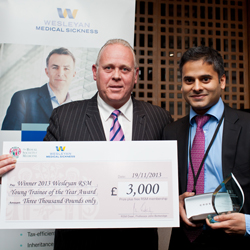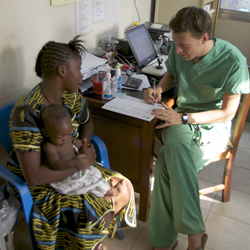 Dr Sayan Sen has been named the 2013 winner of the Wesleyan RSM Young Trainee of the Year. Sayan, who works at Imperial and specialises in Cardiology was the overall winner against 50 other doctors, already RSM prize winners within their respective specialties.
Dr Sayan Sen has been named the 2013 winner of the Wesleyan RSM Young Trainee of the Year. Sayan, who works at Imperial and specialises in Cardiology was the overall winner against 50 other doctors, already RSM prize winners within their respective specialties.
Sayan was shortlisted alongside five other doctors, representing a variety of medical fields from across the country. Each of them had to make a detailed presentation on their specialist subject to a panel made up of eminent medical professionals including Professor Parveen Kumar, Professor John Betteridge, Dean of the Royal Society of Medicine and Ben Attwood President of Wesleyan Medical Sickness’ Junior Advisory Board.
We interviewed him to find out what winning the award meant and how the £3,000 prize money will be used to help him progress his already successful career.
Could you describe to everyone who missed out on your award winning presentation what it was about and its key findings?
Patients with coronary artery disease often present with chest pain. As cardiologists we may be able to treat these patients with coronary stents. However, it is not always clear which artery is causing the problem. Cardiologists have developed several ways of trying to decipher which arteries need stenting. However, the existing tests require the administration of potent vasodilators during their measurements.
The administration of these drugs, causes discomfort to patients and in some countries are prohibitively expensive or simply unavailable. During my research I helped to develop a new way of assessing coronary stenosis severity that circumvents the main limitations of the tests available to clinicians today. Our new index, the instantaneous wave-free ratio (iFR) uses equipment already available in catheter laboratory but samples haemodynamics in a particular part of the cardiac cycle most suitable for stenosis assessment. By doing this we avoid the need to administer potent vasodilator drugs. This means our new test will enable a physiological approach to stenting to be available to more patients globally.
This is such a breakthrough in medicine that is already in use – what impact do you think this will have going forward?
The benefits of using physiology to guide stenting have been established extensively over the last twenty years. In randomised trials such an approach has been demonstrated to improve patient outcomes and reduce healthcare costs. Despite this physiology guided treatment is only rarely performed (<6% of all stenting procedures). One of the reasons for this is the need to administer potent vasodilators during the measurements of the current tests. These drugs add cost and time to the procedure, cannot be given to all patients and in some countries are simply unavailable.
The index we have developed at Imperial College avoids the need for such drugs and therefore has the potential to permit the use of physiology guided revascularisation in far more patients across the globe. Prior to our findings it was thought that such assessments could only be made with the administration of potent vasodilators. Our findings therefore challenge a dogma that has prevailed in this field for over 30 years.
What does winning the award mean for you?
It is a great honour to have won this prestigious award especially with the high standard of the other entrants. It is hugely beneficial for an aspiring investigator at my stage to have my work evaluated by such an esteemed panel.
What made you go into cardiology as a specialty?
The specialty is constantly evolving and tries to take a very objective and scientific approach to patient therapy. Interventional cardiology combines a practical aspect which is particularly appealing to me. The specialty also lends itself to clinical research.
What are your next steps for this research and your career?
The next step for this research is to validate our new index in a large randomised trial. This will be the purpose of the FLAIR trial; an investigator lead study that aims to recruit 2500 patients. This will be the largest study of its kind ever performed. I will be the clinical lead of this trial so I envisage being very busy over the next few years!
What has helped you to get where you are today?
I have a competitive nature and always want to produce my best. This gives me the drive to work hard and persist despite setbacks. However, I would not be here today without the support of my parents and my family. In particular, my wife, who has been fantastically supportive during my training and research.
In terms of medicine, cardiology and research I am indebted to Dr Justin Davies, Prof Darrel Francis and Prof Jamil Mayet. Not only have they have taught me invaluable lessons in medicine and research but also life in general.
What are your top 3 tips for a successful career in medicine?
- Work Hard
- Don’t hold yourself back or be afraid to think differently
- If at first you don’t succeed, don’t give up!
For those who want to apply for the Young Trainee of the Year award – what advice would you give?
I would definitely recommend submitting your work for this prestigious award. It enables you to showcase all your hard work and expose it to critical appraisal – invaluable for any aspiring investigators!
RSM provides over £60,000 a year for trainees in prize money to find out more visit http://www.rsm.ac.uk/academ/awards/
The above information does not constitute financial advice. If you would like more information or need specialist financial advice, call Wesleyan Medical Sickness on 0800 358 6060 or visit the website at www.wesleyan.co.uk/doctors.


